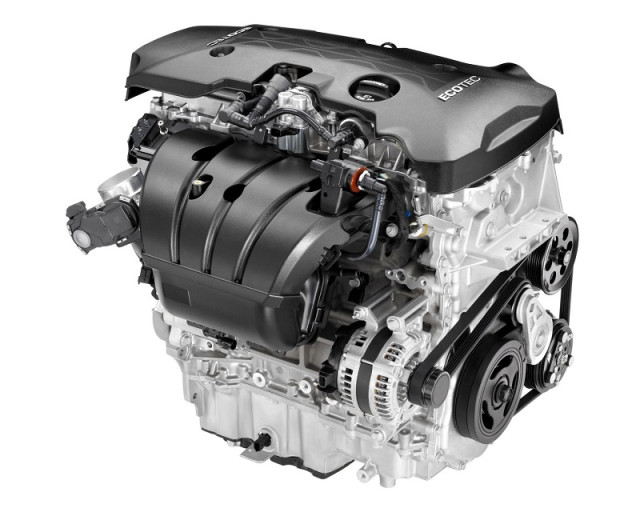

Drivers of the new 2014 Chevrolet Impala will enjoy sweet sound and sweeter savings at the pump thanks to precision noise reduction and a new advanced valvetrain technology on the Ecotec 2.5L four-cylinder engine, arriving in dealerships this month.
Chevrolet expects the 2.5L model to be a popular choice among Impala buyers. More than two-thirds of Chevrolet cars sold in the first quarter of 2013 had a four-cylinder engine.
“Impala customers have three engines to choose from, appealing to a wide array of needs,” said Chris Perry vice president, Chevrolet Marketing. “But the 2.5L model in particular offers both improved fuel economy as well as an accessible starting price of $27,535.”
Chevrolet expects its new flagship sedan to be more fuel efficient, due in part to the 2.5L engine’s Intake Valve Lift Control technology.
In older engines, valves operate strictly based on mechanical camshaft rotation, opening and closing the same way all the time. Chevy’s new system allows the valves to open and close by varied amounts and at different times depending on power demand to provide greater fuel efficiency or power.
When the technology operates in low-lift mode, the engine pumps only the air it needs to meet the driver’s demand. The system switches to high-lift mode at higher engine speeds or under heavy loads, providing the full output capability of the engine.
Impala’s 2.5L engine, which delivers SAE-certified 196 horsepower (146 kW) and 186 lb-ft of torque (252 Nm), achieves variable valve lift using an all-new rocker arm that switches between low and high lift intake cam profiles. The mechanism is actuated by an oil control valve through a dual-feed stationary hydraulic lash adjuster. It is the first of its kind for low friction roller-type finger-follower valvetrains in gasoline engines. The engine’s computer continuously selects the optimal lift profile based on conditions such as engine speed and load.
“Intake Valve Lift Control works so seamlessly drivers aren’t likely to notice it at all,” said Mike Anderson, General Motors’ global chief engineer for Ecotec engines. “What they will notice is a fuel economy improvement of up to one mile per gallon.” The EPA estimated fuel economy for the 2014 Impala with the new 2.5L engine is 21 mpg city and 31 mpg highway.
The redesigned large sedan’s 2.5L engine with direct injection is engineered to be one of the quietest and most refined in the segment. The development team reduced engine noise intensity by 40 percent by specifically targeting the 2.5L’s noise frequency signature. They pushed radiated noises into a higher frequency range well above 2,000 hertz, which is more pleasing to the ear – particularly in the high-load operating ranges where engine sound is most intense.
The refinement-enhancing changes and improvements over previous Ecotec engines ranged from the comparatively simple – such as integrating a sound-absorbing cover into the intake manifold and specifying quieter drive chains – to more fundamental architecture items, such as relocating the balance shafts from the cylinder block to a cassette within the oil pan.
Impala’s passengers get a quieter driving experience due in part to active noise cancelling technology and a more refined sound as the engine revs to its 7,000-rpm peak – a sound that GM Noise and Vibration Engineer Tom Slopsema likens to the precision purr of a sewing machine.
“We focused on reducing the overall engine noise level and placing the remaining noise in a higher frequency range,” Slopsema said. “No fastener, cover or internal engine part was left unexamined in our quest to make this engine one of the quietest in the industry.”
Impala offers three fuel-efficient powertrains, including the 3.6L V-6, the new Ecotec 2.5L four-cylinder and the Ecotec 2.4L with eAssist.
